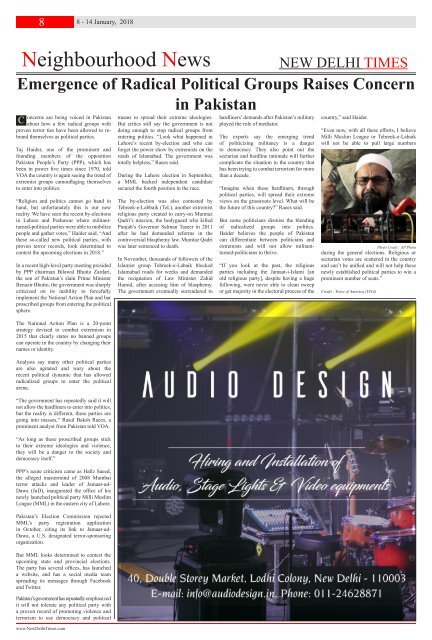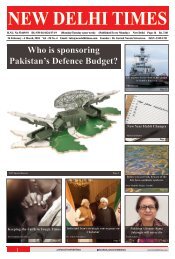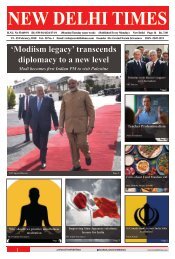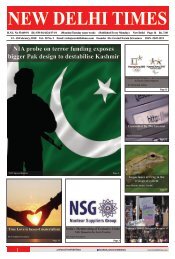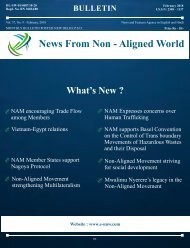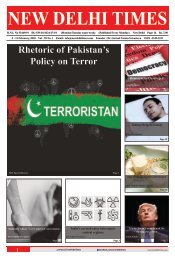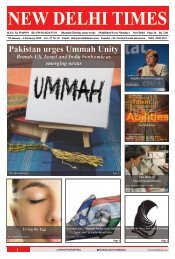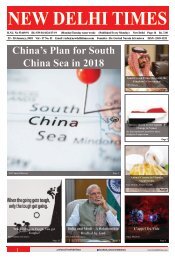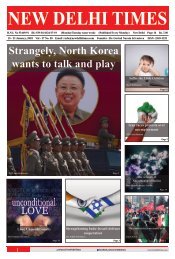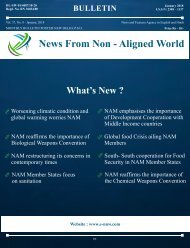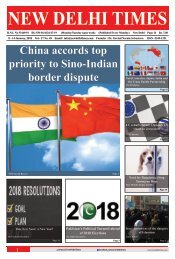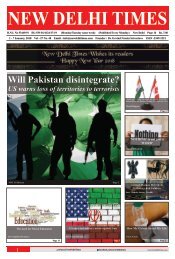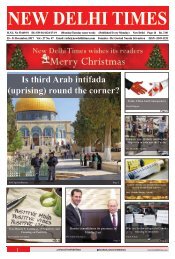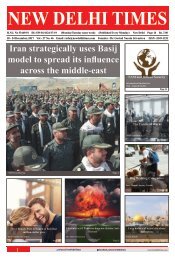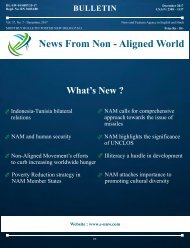8-14 January 2018 - 16-min
Create successful ePaper yourself
Turn your PDF publications into a flip-book with our unique Google optimized e-Paper software.
8<br />
8 - <strong>14</strong> <strong>January</strong>, <strong>2018</strong><br />
C<br />
Neighbourhood News<br />
www.NewDelhiTimes.com<br />
NEW DELHI TIMES<br />
Emergence of Radical Political Groups Raises Concern<br />
in Pakistan<br />
oncerns are being voiced in Pakistan<br />
about how a few radical groups with<br />
proven terror ties have been allowed to rebrand<br />
themselves as political parties.<br />
Taj Haider, one of the pro<strong>min</strong>ent and<br />
founding members of the opposition<br />
Pakistan People’s Party (PPP), which has<br />
been in power five times since 1970, told<br />
VOA the country is again seeing the trend of<br />
extremist groups camouflaging themselves<br />
to enter into politics.<br />
“Religion and politics cannot go hand in<br />
hand, but unfortunately this is our new<br />
reality. We have seen the recent by-elections<br />
in Lahore and Peshawar where militantturned-political<br />
parties were able to mobilize<br />
people and gather votes,” Haider said. “And<br />
these so-called new political parties, with<br />
proven terror records, look deter<strong>min</strong>ed to<br />
contest the upco<strong>min</strong>g elections in <strong>2018</strong>.”<br />
In a recent high-level party meeting presided<br />
by PPP chairman Bilawal Bhutto Zardari,<br />
the son of Pakistan’s slain Prime Minister<br />
Benazir Bhutto, the government was sharply<br />
criticized on its inability to forcefully<br />
implement the National Action Plan and bar<br />
proscribed groups from entering the political<br />
sphere.<br />
The National Action Plan is a 20-point<br />
strategy devised to combat extremism in<br />
2015 that clearly states no banned groups<br />
can operate in the country by changing their<br />
names or identity.<br />
Analysts say many other political parties<br />
are also agitated and wary about the<br />
recent political dynamic that has allowed<br />
radicalized groups to enter the political<br />
arena.<br />
“The government has repeatedly said it will<br />
not allow the hardliners to enter into politics,<br />
but the reality is different, these parties are<br />
going into masses,” Rasul Baksh Raees, a<br />
pro<strong>min</strong>ent analyst from Pakistan told VOA.<br />
“As long as these proscribed groups stick<br />
to their extreme ideologies and violence,<br />
they will be a danger to the society and<br />
democracy itself.”<br />
PPP’s acute criticism came as Hafiz Saeed,<br />
the alleged master<strong>min</strong>d of 2008 Mumbai<br />
terror attacks and leader of Jamaat-ud-<br />
Dawa (JuD), inaugurated the office of his<br />
newly launched political party Milli Muslim<br />
League (MML) in the eastern city of Lahore.<br />
Pakistan’s Election Commission rejected<br />
MML’s party registration application<br />
in October, citing its link to Jamaat-ud-<br />
Dawa, a U.S. designated terror-sponsoring<br />
organization.<br />
But MML looks deter<strong>min</strong>ed to contest the<br />
upco<strong>min</strong>g state and provincial elections.<br />
The party has several offices, has launched<br />
a website, and has a social media team<br />
spreading its messages through Facebook<br />
and Twitter.<br />
Pakistan’s government has repeatedly emphasized<br />
it will not tolerate any political party with<br />
a proven record of promoting violence and<br />
terrorism to use democracy and political<br />
means to spread their extreme ideologies.<br />
But critics still say the government is not<br />
doing enough to stop radical groups from<br />
entering politics. “Look what happened in<br />
Lahore’s recent by-election and who can<br />
forget the power show by extremists on the<br />
roads of Islamabad. The government was<br />
totally helpless,” Raees said.<br />
During the Lahore election in September,<br />
a MML backed independent candidate<br />
secured the fourth position in the race.<br />
The by-election was also contested by<br />
Tehreek-e-Labbaik (TeL), another extremist<br />
religious party created to carry-on Mumtaz<br />
Qadri’s mission, the bodyguard who killed<br />
Punjab’s Governor Salman Taseer in 2011<br />
after he had demanded reforms in the<br />
controversial blasphemy law. Mumtaz Qadri<br />
was later sentenced to death.<br />
In November, thousands of followers of the<br />
Islamist group Tehreek-e-Labaik blocked<br />
Islamabad roads for weeks and demanded<br />
the resignation of Law Minister Zahid<br />
Hamid, after accusing him of blasphemy.<br />
The government eventually surrendered to<br />
hardliners’ demands after Pakistan’s military<br />
played the role of mediator.<br />
The experts say the emerging trend<br />
of politicizing militancy is a danger<br />
to democracy. They also point out the<br />
sectarian and hardline rationale will further<br />
complicate the situation in the country that<br />
has been trying to combat terrorism for more<br />
than a decade.<br />
“Imagine when these hardliners, through<br />
political parties, will spread their extreme<br />
views on the grassroots level. What will be<br />
the future of this country?” Raees said.<br />
But some politicians dismiss the blending<br />
of radicalized groups into politics.<br />
Haider believes the people of Pakistan<br />
can differentiate between politicians and<br />
extremists and will not allow militantturned-politicians<br />
to thrive.<br />
“If you look at the past, the religious<br />
parties including the Jamaat-i-Islami [an<br />
old religious party], despite having a huge<br />
following, were never able to clean sweep<br />
or get majority in the electoral process of the<br />
country,” said Haider.<br />
“Even now, with all these efforts, I believe<br />
Milli Muslim League or Tehreek-e-Labaik<br />
will not be able to pull large numbers<br />
during the general elections. Religious or<br />
sectarian votes are scattered in the country<br />
and can’t be unified and will not help these<br />
newly established political parties to win a<br />
pro<strong>min</strong>ent number of seats.”<br />
Credit : Voice of America (VOA)<br />
Photo Credit : AP Photo


